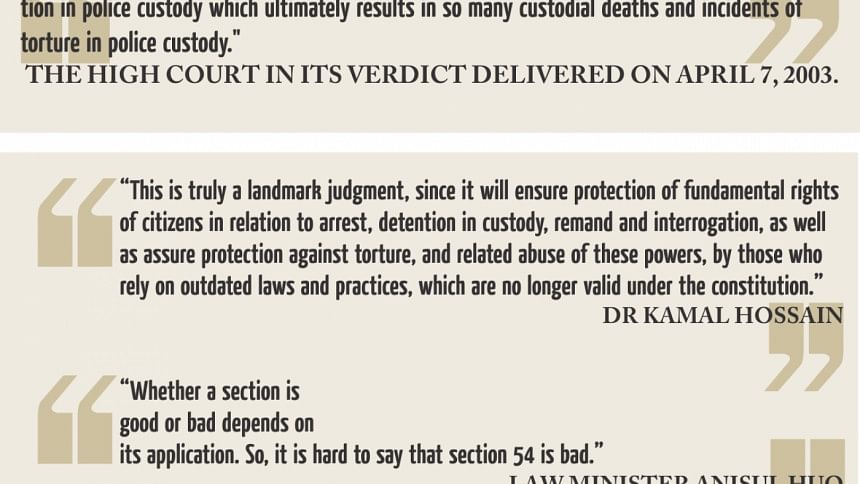No more blanket powers for cops

The police have finally lost the century-old wide discretionary powers concerning arrest, detention in custody and remand, as the Supreme Court yesterday upheld a High Court verdict against the arbitrary use of their sweeping authority.
The HC verdict delivered on April 7, 2003 asked the government to amend some provisions of the Code of Criminal Procedure (CrPC) of 1898, which provided the police with the controversial powers, for their inconsistency with the constitution.
In its full verdict, the court outlined some recommendations for making changes to the provisions.
It also made proposals for bringing amendments to three other laws for safeguarding people's liberty and fundamental rights guaranteed by the constitution. They are Penal Code 1860, Police Act 1861 and Evidence Act 1872.
The HC verdict said the amendments are required to limit the arbitrary use of powers by the police and magistrates in relation to arrest and remand and to take necessary steps in case of custodial death.
The HC issued a 15-point directive and asked the government to comply with it immediately to stop police from making arbitrary arrests on suspicion and torturing arrestees on remand.
The directives, according to the HC verdict, are needed to be followed until the relevant laws are amended.
The HC delivered the landmark judgment following a write petition filed by a group of human rights organisations and individuals after the tragic death of Shamim Reza Rubel, a student of Independent University, in police custody on July 23, 1998.
But the then BNP-led government opted to file an appeal against the verdict.
The AL-led government has followed the same path and pursued the appeal.

Yesterday, a four-member bench of the Appellate Division of the SC, headed by Chief Justice Surendra Kumar Sinha, dismissed the appeal against the HC verdict.
The apex court said it would set some guidelines on enforcement of sections 54 and 167 of the CrPC of 1898 dealing with arrest on suspicion and subsequent remand, as the HC has ruled that the sections were inconsistent with the fundamental rights guaranteed by the constitution.
The guidelines and modifications would be mentioned in the full judgement, the SC added.
The apex court's verdict has won plaudits from legal experts and human rights activists.
"This is truly a landmark judgement since it will ensure protection of the fundamental rights of citizens in relation to arrest, detention in custody, remand and interrogation,” writ petitioners' counsel Dr Kamal Hossain said in a statement.
It would also guarantee protection against torture and abuse of powers by those who rely on outdated laws and practices that are no longer valid under the constitution, he said.
Asked, Law Minister Anisul Huq said section 54 gives emergency powers to police, but it loses its efficacy if it is misused.
"I have heard from the attorney general's office that the government's appeal was dismissed. I will not make any comment until I read the full judgment of the apex court," he told The Daily Star.
Attorney General Mahbubey Alam told this correspondent that once the government receives a copy of the full judgment, it would decide whether it would move a petition with the SC seeking a review of the verdict.
He hoped the government would take steps in line with the SC directives.
In the last 13 years, none of the HC directives were followed by the police.
During the hearing on the government's appeal against the HC verdict on April 17, the Appellate Division expressed displeasure about it.
"Thirteen years back, the High Court had given some specific directives on the detention of any person and subsequent dealings with the detainees on remand. But the government did not implement any of them," it said.
One of the directives says an accused must be interrogated by the investigation officer in a prison room, not in a police interrogation cell. The prison room must have a glass wall or a wall with grills on one side so that the accused is visible to the lawyer or his relatives.
In another directive, the HC bars police from detaining a person under the Special Powers Act of 1974 after picking him up on suspicion.
Barrister M Amir-Ul Islam, another counsel for the writ petitioners, said the government must comply with HC directives as the SC has never stayed those.
Law enforcers should follow the directives, which would remain in force until the relevant law is amended, he said.
WHY LAWS NEED TO BE CHANGED
Citing that 38 people died in custody in 2002, the HC verdict said, "This is absolutely shocking… Obviously, such tragic deaths resulted due to sweeping and unhindered power given to a police officer under section 54 of the Code [CrPC]."
Examining section 54, the HC said the police can exercise the power abusively. There is nothing in this section which allows the accused to be furnished with the grounds for his arrest. It is a basic human right that whenever a person is arrested he must know the reasons for his arrest, it stated.
"As section 54 now stands, a police officer is not required to disclose the reasons for the arrest to the person whom he has arrested," the HC said.
It goes against article 33(1) of the constitution, noted the court.
About section 167 of the CrPC dealing with remand, the HC said a magistrate exercises the power to pass an order authorising detention in police custody.
It is surprising that no guideline has been given in sub-section (2) and (3) of section 167 as to the circumstances under which detention in police custody may be authorised, it added.
"The magistrate in the absence of any guideline passes a parrot like order authorising detention in police custody which ultimately results in so many custodial deaths and incidents of torture in police custody," the HC said.
If the purpose of interrogation of an accused is to extract information from him, the information gleaned from the person cannot be used against him in view of article 35 (4) of the constitution, it added.
Article 35 (4) clearly provides that no person accused of any offence shall be compelled to be a witness against himself.
"So, we do not understand how a police officer or a Magistrate allowing remand can act in violation of the constitution and provisions of other laws including this Code [CrPC] and can legalise the practice of remand," said the HC.
"Through judicial pronouncements, it is also established that any statement made by any accused before a police officer in course of his interrogation cannot be used against any other accused."
The use of force to extract information can never be justified. Use of force is totally prohibited under article 35 (5) of the constitution, it said.
"Thus, it is clear to us that the very system of taking an accused on remand for the purpose of interrogation and extraction of information by application of force on such a person is totally against the spirit and explicit provisions of the constitution."
The existing provisions of section 167 of the CrPC appear to the HC insufficient for taking appropriate and effective action in case of custodial death.
Under the provisions, the magistrate is not bound to hold an inquiry. The HC proposed changing the law to make it mandatory for the magistrate to inquire into the custodial death.
"We are also of the view that causing death in police custody or in jail is more heinous than death caused by an individual."
If someone dies in police custody or in jail, it is difficult for the victim's relatives to prove as to who caused the death, said the HC.
"In many cases, this court has decided that when a wife dies while in custody of the husband, the husband shall explain how the wife met her death. Similar principle may be applied when a person dies in police custody or in jail."
Proposing a change in the Evidence Act, the HC said the new section in the act shall provide that when a person dies in police custody or in jail, the jail authorities or the police officer, who arrested the person or took him in custody for interrogation, shall explain the reasons for the death and shall provide relevant facts to substantiate the explanation.
About the Police Act of 1861, it said there is no provision for maintaining any diary to record reasons for arrests without any warrant and other necessary particulars.
The HC recommended inclusion of a new section in the Police Act to overcome the deficiency.

 For all latest news, follow The Daily Star's Google News channel.
For all latest news, follow The Daily Star's Google News channel. 








Comments